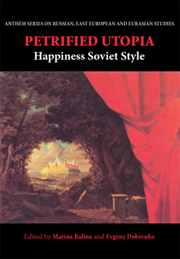Book contents
- Frontmatter
- Contents
- List of Illustrations
- Acknowledgments
- List of Contributors
- Introduction
- Petrified Utopia
- Part One Utopics
- 1 A Joyful Soviet Childhood: Licensed Happiness for Little Ones
- 2 Utopian Naturalism: The Epic Poem of Kolkhoz Happiness
- 3 Luxuriating in Lack: Plentitude and Consuming Happiness in Soviet Paintings and Posters, 1920s–1953
- 4 Tasty and Healthy: Soviet Happiness in One Book
- Part Two Realities
- Part Three Locations
- Notes
- Index
1 - A Joyful Soviet Childhood: Licensed Happiness for Little Ones
from Part One - Utopics
Published online by Cambridge University Press: 05 March 2012
- Frontmatter
- Contents
- List of Illustrations
- Acknowledgments
- List of Contributors
- Introduction
- Petrified Utopia
- Part One Utopics
- 1 A Joyful Soviet Childhood: Licensed Happiness for Little Ones
- 2 Utopian Naturalism: The Epic Poem of Kolkhoz Happiness
- 3 Luxuriating in Lack: Plentitude and Consuming Happiness in Soviet Paintings and Posters, 1920s–1953
- 4 Tasty and Healthy: Soviet Happiness in One Book
- Part Two Realities
- Part Three Locations
- Notes
- Index
Summary
In a recent essay, the Russian ethnolinguist Anna Zaliznyak claimed that the word schast'e, usually rendered in English by ‘happiness’, actually represents a quite specific emotional state. ‘Happy’ is adequately translated, she asserts, only by dovol'nyi, which suggests a comparable sense of well-anticipated and serene contentment. Schast'e, on the other hand, refers to a kind of elation that is extreme, sudden, and not to be relied on; it is a type of ‘earthly bliss’ that exists mainly in the future or in the past (i.e., is a potential force), and that cannot be attained by ‘some algorithmic means–deserved or earned’. So unusual and accidental is the feeling, that it is also ‘slightly shameful’. As always with this kind of exercise in comparative definition, one is tempted to dispute the nationally specific tenor of the analysis; the fact that ‘happiness’ is not the right translation for schast'e surely does not mean that there is no translation for schast'e (‘bliss’ would be fairly close), or that the emotional state so defined is unrecognizable to a person without that term in their linguistic range. However, there are two directions in which discussion can usefully run. One is that Zaliznyak foregrounds an association–which is indeed difficult to capture in English–between ‘happiness’ in the emotional sense and good luck (compare the Latinate term ‘fortunate’).
- Type
- Chapter
- Information
- Petrified UtopiaHappiness Soviet Style, pp. 3 - 18Publisher: Anthem PressPrint publication year: 2009
- 8
- Cited by



